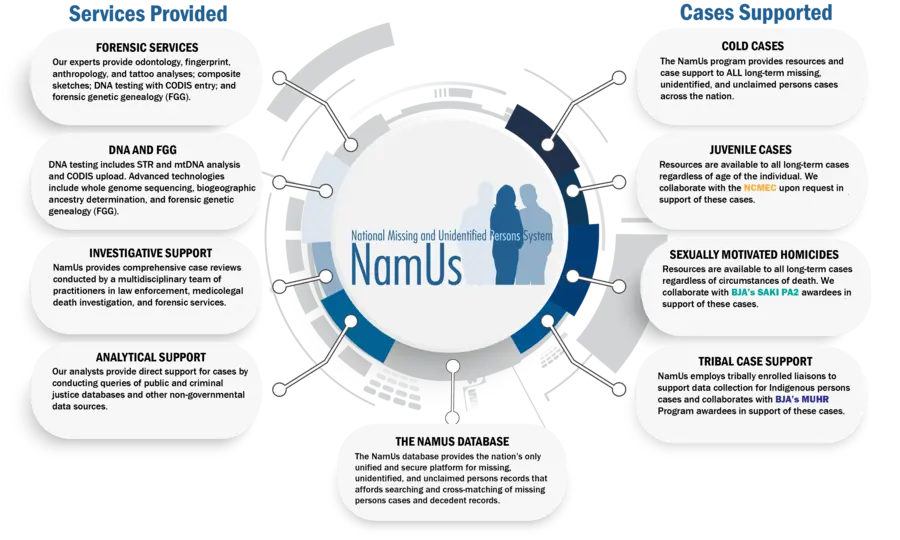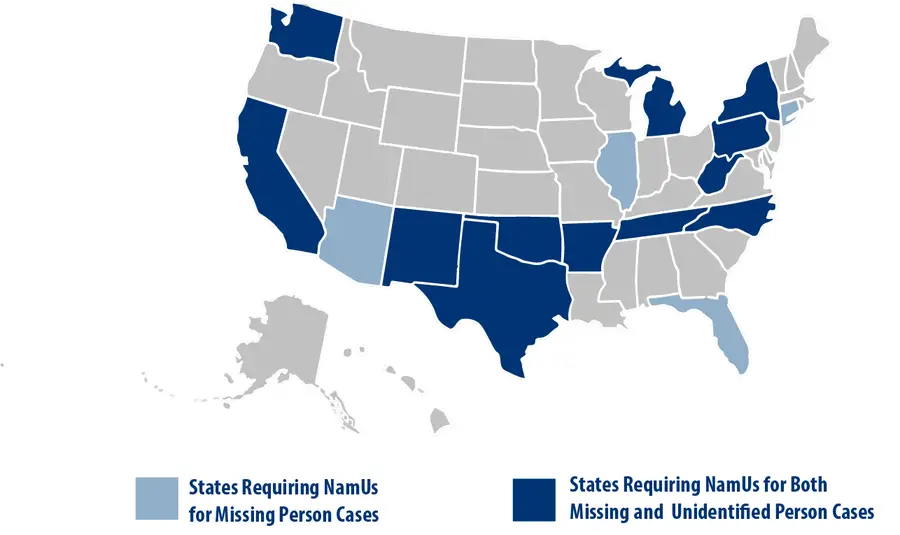The nation’s only centralized federal program that provides forensic, investigative, and analytical services to resolve all long-term missing-persons and unidentified decedent cases.
Objective
To enhance the national response to missing and unidentified persons casework through innovative technology, forensic and analytical services, investigative support, training and outreach, and collaboration and coordination at the federal, state, tribal, and local levels.
Approach
RTI manages the contract for the National Institute of Justice’s (NIJ) National Missing and Unidentified Persons System (NamUs), providing investigative, forensic, and operations support. NamUs is the nation’s only federally legislated program that supports the investigation of all long-term missing, unidentified, and unclaimed persons cases.
Impact
NamUs supports the families of the missing; facilitates collaboration between federal agencies; improves data sharing between criminal justice organizations at all levels of government; and enhances investigative techniques used in missing, unidentified, and unclaimed persons casework. The program’s comprehensive approach and the resources it provides are vital in addressing this complex issue.
For the most up-to-date information regarding the National Missing and Unidentified Persons System (NamUs), please visit the NamUs website.
The sheer volume of missing and unidentified persons cases in the United States is one of the greatest challenges faced by the criminal justice community. This problem is compounded by the existence of disparate databases housing these case records and the number of cases that cut across jurisdictional boundaries. The National Institute of Justice's (NIJ) National Missing and Unidentified Persons System (NamUs) database, managed by RTI, provides a unified solution for missing and unidentified persons cases by streamlining communication and data sharing between criminal justice agencies and improving searching capabilities for missing and unidentified persons cases across the nation.
NamUs works with federal, state, tribal, and local law enforcement agencies to resolve domestic cases and those involving foreign nationals last known to have been in the United States. The NamUs program facilitates quicker identifications and reunions by improving access to information, technology, and resources.
Since 2021, RTI has managed the NamUs database, providing best-in-class investigative, forensic, and operations support. RTI's multidisciplinary team of experts, who collectively bring a wide range of forensics and investigations experience, are well-equipped to manage this vital database.
Addressing the Nation’s Silent Mass Disaster
Each year, more than 600,000 people are reported missing in the United States. Additionally, thousands of human remains in morgues and cemeteries across the country are identified. Estimates suggest there are as many as 40,000 unidentified human remains nationwide at any given point in time. The cumulative effect of so many missing and unidentified persons cases has created a significant societal burden as families and communities are left to deal with the ambiguous loss of their missing neighbors, friends, and loved ones.
Many law enforcement agencies and medical examiners/coroners lack the resources needed to handle the volume and complexity of these cases. As a result, many of these cases remain unsolved for extended periods, culminating in what has often been referred to as our nation’s silent mass disaster.
In response to this problem, the National Institute of Justice (NIJ) established NamUs to provide resources that will help resolve missing and unidentified persons cases. NamUs is the only national database for long-term missing, unidentified, and unclaimed persons cases that allows for searching and crossmatching of missing persons and unidentified human remains records. It provides direct technical, investigative, analytical, and forensic support for the criminal justice community; and it allows limited access to the public, empowering family members to take a more proactive role in the search for their missing loved ones.
The NamUs Approach
NamUs unites the people investigating these cases with the resources they need to find the missing and return the names to the hundreds of unknown decedents across the country. In this effort, NamUs stands as a singular resource hub for law enforcement, medical examiners, coroners, and other allied investigating professionals. By providing a platform to connect law enforcement agencies and medical examiner/coroner offices, NamUs facilitates communication and data sharing between the two groups working these cases.

Since its inception, NamUs has helped resolve more than 46,000 missing, unidentified, and unclaimed persons cases. Of those cases, more than 10,000 identifications were made via NamUs services, including DNA analysis (CODIS associations or direct DNA comparisons), forensic genetic genealogy, forensic odontology, fingerprint examination, anthropological review, and radiograph comparisons. NamUs currently houses records for more than 54,000 active missing, unidentified, and unclaimed persons cases, including juveniles and adults.
NamUs provides forensic and investigative support free of charge to its users. The program offers the following services:
- Forensic investigative genetic genealogy
- Traditional DNA testing, including STR, Y-STR, and mitochondrial DNA analysis with CODIS entry
- Forensic anthropological analysis of skeletal remains to determine forensic significance, develop biological profiles, contribute to cause and manner of death determinations, and facilitate radiographic comparisons
- Support for the acquisition and searching of fingerprint records, including fingerprint comparisons, through local and federal databases
- Forensic odontology services to provide National Crime Information Center (NCIC) coding and comparison of antemortem and postmortem records
- Analytical support including indications of life for persons reported missing, contact information for family members for DNA sample collections and next of kin notifications, and leads related to unidentified persons cases
- Multidisciplinary team review for long-term cases
- Forensic artistry
- Facial recognition and comparison
NamUs Legislation and its Impact on the Program
By the close of fiscal year (FY) 2023, 16 states had passed legislation that involved NamUs. This number continues to grow, as does support for federal legislation.

States with impactful legislation.
In addition, the passing of Public Law 117-327 (Billy’s Law) federally legislates NamUs to provide the following:
- Online database technology, which serves as a national repository to help expedite case associations and resolutions
- Various free-of-charge forensic services to aid in the identification of missing persons and unidentified human remains
- Investigative support for criminal justice efforts to help resolve missing and unidentified person cases
- Technical assistance for family members of missing persons
- Assistance and training by coordinating state and local service providers to support individuals and families impacted by the loss or disappearance of a loved one
- Training and outreach from NamUs subject matter experts, including assistance with planning and facilitating Missing Person Day events across the country
Quick Facts about NamUs
0
active cases in the NamUs database
0 %
of missing persons are young adults or juveniles
0
cases resolved as of 2023
- National Institute of Justice (NIJ)
- U.S. Department of Justice (DOJ)
- Federal Bureau of Investigation
- Othram Inc.
- Bode Technology
- Minnesota Bureau of Criminal Apprehension
- DC Office of the Chief Medical Examiner



